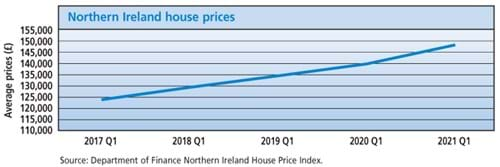08 Nov 2021
Housing policy in Northern Ireland to be transformed?
A year ago, Northern Ireland’s minister for communities announced that substantial changes lay ahead for housing policy. The most significant was the intention to reclassify the Northern Ireland Housing Executive (NIHE) landlord arm as a mutual or co-operative which would allow it to borrow outside public sector controls, invest in its homes and ultimately build again. The proposal was also seen as better promoting the involvement of tenants in their housing service as they would be integrated into its management. Although this high-level ambition to revitalise NIHE is still lacks detail, its impact on housing in Northern Ireland (NI) could be significant, especially for applicants waiting for a social home. As it stands, the number of applicants has risen to almost 45,000 with 31,000 of those considered to be in housing stress.
After a three-year political stalemate, compounded by restrictions on building work during the COVID-19 pandemic, the Department for Communities (DfC) announced that construction of 2,403 new social homes started in 2020/21 - a 30 per cent increase on the 1,850 target previously set by the NI Executive, although partly boosted by starts delayed by the early stages of the pandemic. In May, DfC allocated an additional £26 million for the Social Housing Development Programme for 2021/22. While this is positive news, constraints such as land availability in areas of high housing demand, a lack of sewerage infrastructure and skills shortages all remain a barrier to increasing supply.
As is the case elsewhere in the UK the pandemic has had a surprising effect on the housing market. Despite the NI economy shrinking by ten per cent, house prices increased by six per cent in a year. Over the four years shown in the chart below, prices rose almost 20 per cent while in the UK overall they rose by 15 per cent. However, with the end of stamp duty relief in September a fall in demand for larger properties might be expected, and there are also fewer properties on the market in comparison to pre-pandemic levels.

Northern Ireland house prices
Source: Department of Finance, Northern Ireland House Price Index
The ongoing issue of the ‘cliff edge’ facing welfare recipients in NI is still not fully resolved. A mitigation scheme protects tenants from the benefit cap and bedroom tax that apply in England and Wales. However, gaps exist, currently impacting over 1,200 households, because a tenant has no protection from the bedroom tax if they have moved and currently under-occupy the property or if they were not in receipt of certain benefits in 2016. Despite a commitment in the New Decade, New Approach agreement which restored the Northern Ireland government after a three-year hiatus, legislation to close these gaps has yet to be tabled. While the delay continues, households are denied protection despite cross-party support for mitigation to cover all those affected. In the meantime, for these households the ‘cliff edge’ remains a real threat.
The Private Tenancies (Coronavirus Modifications) Act (NI) 2020 temporarily required landlords to give tenants a 12-week notice-to-quit period. With the prospect of a return to the statutory four-week notice-to-quit period in September, the DfC now intends to legislate for a longer period to strengthen security of tenure for private renters and increase the appeal of the NI private market. CIH Northern Ireland has contributed to the DfC’s review and looks forward to seeing the outcome.
A Private Tenancies Bill is also at the first stage of the legislative process. It would place restrictions on the frequency of rent increases, extend notice periods and introduce new regulations on standards of electrical safety and energy efficiency. However, it is unclear if the Bill will receive royal assent before the end of the Executive’s current term in March 2022.
The degree to which the pandemic has fundamentally changed social policy in NI remains to be seen. One issue where a precedent has been set, as elsewhere in the UK, is the safeguarding of people who have found themselves homeless, together with changes in homelessness services themselves. NIHE worked together with the rest of the sector to ensure no person was left on the streets during the early days of the pandemic, by maximising the availability of temporary accommodation across NI. NIHE has since committed to protect the progress achieved through their new plan, The Way Home, where they restate the NI Homeless Strategy’s aim of ending homelessness altogether. The plan says that ‘…during these unprecedented times, we’ve proven what can be done collaboratively. It is collaboratively that we will plot the route through this changed environment to identify long-term sustainable outcomes to the issue of homelessness.'
This article is based on one for the CIH’s UK Housing Review. You can download the 2021 UK Housing Review Autumn Briefing Paper.
Heather Wilson is the policy and engagement manager in CIH Northern Ireland.


